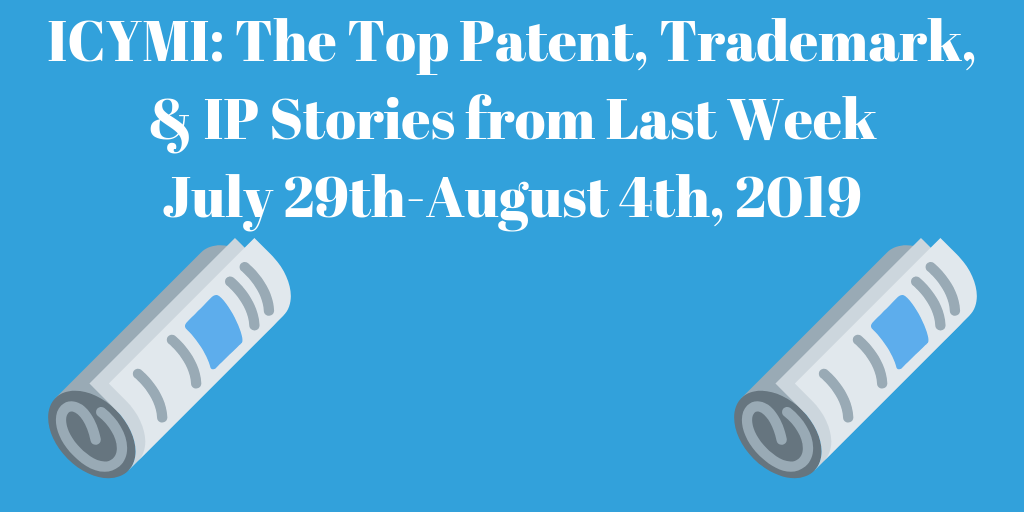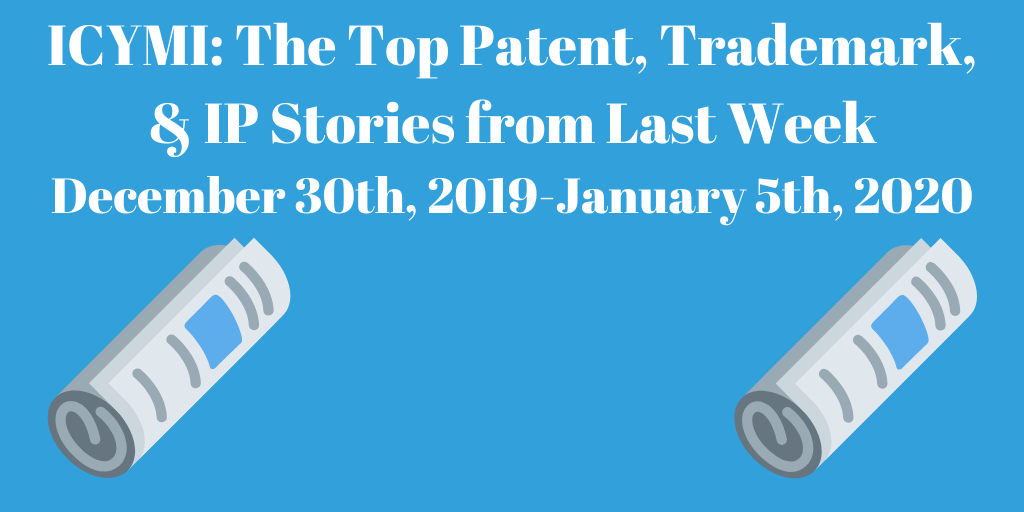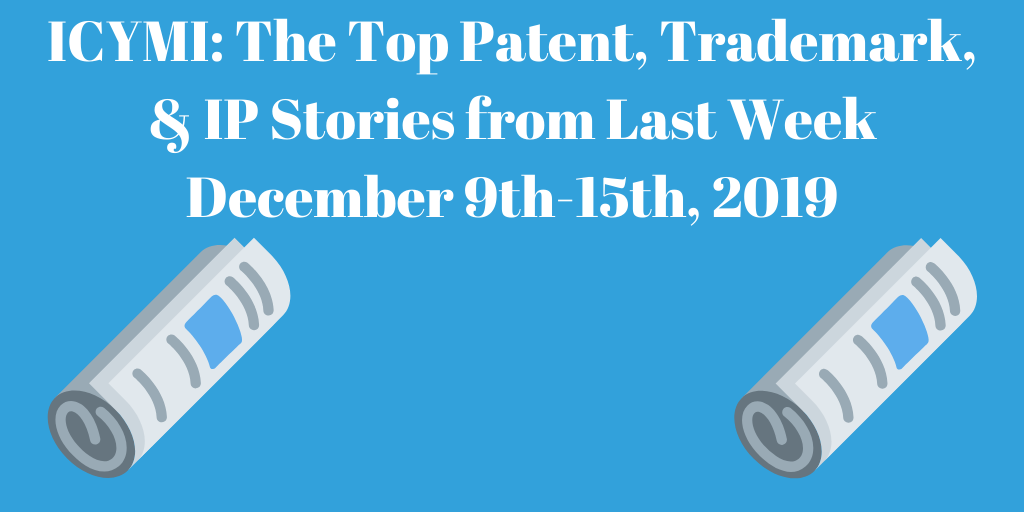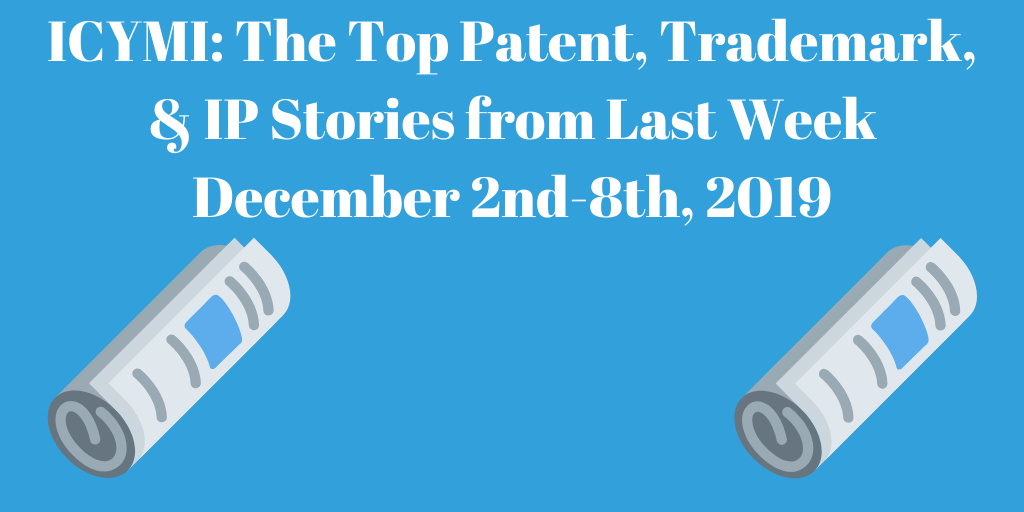Top Patent, Trademark, and IP Stories from Last Week (7/29-8/4/19)
Every week, we will be highlighting the top patent, copyright, trademark, intellectual property, etc. stories of the previous week in our “In Case You Missed It” segment. The list itself is in no particular order and includes a wide range of stories from the patent world that are informative, noteworthy, or just plain bizarre. The stories included encompass everything from Supreme Court cases to insights into growing industries. Please feel free to comment your thoughts on the stories or share an important one we missed!
“AI System ‘Should Be Recognised as Inventor’”
Can a robot be given credit for an invention? That is the question at the center of an ongoing debate in the UK after an AI algorithm named “Dabus” created two novel inventions on its own, without human intervention. Dabus is part of “The Artificial Inventor Project” which aims to provide IP rights for AI that autonomously invent. That said, the group still argues that AI has no “legal personality” and “cannot own property.”
The AI was able to conceive a food container with fractal shapes to allow for easier storage and transportation as well as a light with “uniquely-identifiable signal beacons.” The signals are recognizable to the human brain in the presence of other visual stimuli and intended for use in an emergency rescue situations. So, who gets the credit?

(Source: Artificial Inventor Project)
The AI’s own creator and two law professors teaming up with him believe the AI should get it and they are trying to attribute the inventions to the AI in their patent filings. They argue that although a robot’s creator should be the patent owner, the robot should be at least recognized for the invention. This is because as robots get more advanced, they will become more autonomous and create inventions on their own. They believe there should be a system for appropriately granting them credit.
It is currently the consensus amongst the different patent offices around the world that an inventor can only be a person. The U.K. Patents Act 1977 and European Patent Convention specifically require inventors be “natural persons.” In 35 U.S. Code § 100, the term “inventor” is restricted to an “individual” or “individuals.” For now, the legal definition of “individual” is limited to “every infant member of the species homo sapiens who is born alive at any stage of development.”
Although the major patent offices are still holding discussions regarding the issue, for now, AI fit in the invention process as “tools” to be used by inventors, not inventors themselves. . To read more about this story, click here (via BBC, August 1st, 2019).
“Court of a-Peel: Nasty Split Over Banana Costume Leads to Legal Monkey Business”
Last week. a district court ruled that costume maker Kangaroo Manufacturing Inc. had infringed on the design of a banana costume sold by Rasta Imposta. The two costume manufacturers had previously worked with each other in 2010 and soon after their split, Kangaroo began selling a nearly identical banana costume.
During the case, Rasta Imposta argued the costumes shared a similar style including unique features that would distinguish them from other banana costumes. Rasta Imposta provided 20 examples of other banana costumes that did not infringe, accounting for variation in details such as banana color, curvature, texture, tip color, etc. The court ruled in Rasta Imposta’s favor. To read more about this story, click here (via The Guardian, August 1st, 2019).
“Getting Under the Hood of Amazon’s Auto Ambitions”
Between December 2016 and May 2019, Amazon filed for 210 patents related to transportation more than Apple (105) and Google (140). These include everything from drones and delivery robots to self-driving car technology. The patents are part of an effort by the company to streamline the delivery process and enable them to have complete control over a package’s arrival. The entire logistics chain from Amazon.com to delivery will be controlled by Amazon Web Services (AWS), the company’s highly touted cloud infrastructure.
The large patent portfolio is part of a creative campaign by Amazon to patent every conceivable delivery apparatus. Back in February, we wrote about Amazon was patenting a process for picking up packages at bus stops. In April, we discussed the plans to deliver packages via drones with hot air balloons. In June, we discussed how Amazon patented a home surveillance feature for their delivery drones and how Wal-Mart and Amazon were both leading the retail space in drone patent filings.
Over the past 6 months, Amazon has shelled out $2 billion to fund transportation startups including Rivian Automotive which makes electric trucks, Aurora which makes self-driving systems, and Deliveroo, a food delivery service. Look for Amazon to be the next great player in the self-driving car and drone industry as their transportation acquisitions and patent filings quickly ramp up. To read more about this story, click here (via Reuters, July 31st, 2019).
“Patent Application Reveals That a Walmart Coin Could Be in the Works”
Following in the footsteps of Facebook’s Libra coin released last month, Wal-Mart is also looking to create a U.S. dollar-backed cryptocurrency according to a new patent application. The coin, backed 1-to-1 with real currency, would serve as an alternate payment for customers, especially those without access to banking services or who have bad credit.

One of the coin’s unique features outlined in the patent is the ability to store customer information within the blockchain. Such information would include customer order history and habits that could allow the store to tailor savings and suggestions to individuals. Iit would also serve as a customer rewards-like program. Additionally, the patent also includes methods for creating, processing, and storing the currency. To read more about this story, click here (via Yahoo! Finance, August 3rd, 2019).




